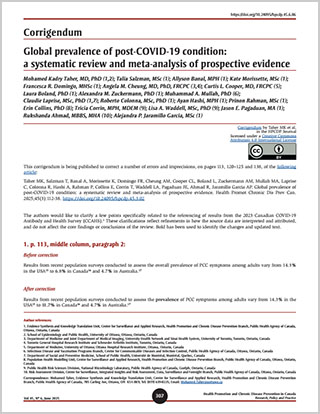Corrigendum – Global prevalence of post-COVID-19 condition: a systematic review and meta-analysis of prospective evidence

HPCDP Journal Home
Published by: The Public Health Agency of Canada
Date published: June 2025
ISSN: 2368-738X
Submit a manuscript
About HPCDP
Browse
Previous | Table of Contents | Next
Mohamed Kadry Taher, MD, PhDAuthor reference footnote 1Author reference footnote 2; Talia Salzman, MScAuthor reference footnote 1; Allyson Banal, MPHAuthor reference footnote 1; Kate Morissette, MScAuthor reference footnote 1; Francesca R. Domingo, MHScAuthor reference footnote 1; Angela M. Cheung, MD, PhD, FRCPCAuthor reference footnote 3Author reference footnote 4; Curtis L. Cooper, MD, FRCPCAuthor reference footnote 5; Laura Boland, PhDAuthor reference footnote 1; Alexandra M. Zuckermann, PhDAuthor reference footnote 1; Muhammad A. Mullah, PhDAuthor reference footnote 6; Claudie Laprise, MSc, PhDAuthor reference footnote 1Author reference footnote 7; Roberto Colonna, MSc, PhDAuthor reference footnote 1; Ayan Hashi, MPHAuthor reference footnote 1; Prinon Rahman, MScAuthor reference footnote 1; Erin Collins, PhDAuthor reference footnote 8; Tricia Corrin, MPH, MDEMAuthor reference footnote 9; Lisa A. Waddell, MSc, PhDAuthor reference footnote 9; Jason E. Pagaduan, MAAuthor reference footnote 1; Rukshanda Ahmad, MBBS, MHAAuthor reference footnote 10; Alejandra P. Jaramillo Garcia, MScAuthor reference footnote 1
https://doi.org/10.24095/hpcdp.45.6.06

Recommended Attribution
Corrigendum by Taher MK et al. in the HPCDP Journal licensed under a Creative Commons Attribution 4.0 International License
Author references
Correspondence
Mohamed Taher, Evidence Synthesis and Knowledge Translation Unit, Centre for Surveillance and Applied Research, Health Promotion and Chronic Disease Prevention Branch, Public Health Agency of Canada, 785 Carling Ave, Ottawa, ON K1A 0K9; Tel: (819) 639-0225; Email: Mohamed.Taher@uottawa.ca
Suggested citation
Taher MK, Salzman T, Banal A, Morissette K, Domingo FR, Cheung AM, Cooper CL, Boland L, Zuckermann AM, Mullah MA, Laprise C, Colonna R, Hashi A, Rahman P, Collins E, Corrin T, Waddell LA, Pagaduan JE, Ahmad R, Jaramillo Garcia AP. Corrigendum – Global prevalence of post-COVID-19 condition: a systematic review and meta-analysis of prospective evidence. Health Promot Chronic Dis Prev Can. 2025;45(6):307-8. https://doi.org/10.24095/hpcdp.45.6.06
This corrigendum is being published to correct a number of errors and imprecisions, on pages 113, 120–125 and 138, of the following article:
Taher MK, Salzman T, Banal A, Morissette K, Domingo FR, Cheung AM, Cooper CL, Boland L, Zuckermann AM, Mullah MA, Laprise C, Colonna R, Hashi A, Rahman P, Collins E, Corrin T, Waddell LA, Pagaduan JE, Ahmad R, Jaramillo Garcia AP. Global prevalence of post-COVID-19 condition: a systematic review and meta-analysis of prospective evidence. Health Promot Chronic Dis Prev Can. 2025;45(3):112-38. https://doi.org/10.24095/hpcdp.45.3.02
The authors would like to clarify a few points specifically related to the referencing of results from the 2023 Canadian COVID-19 Antibody and Health Survey (CCAHS).Footnote 1 These clarifications reflect refinements in how the source data are interpreted and attributed, and do not affect the core findings or conclusions of the review. Bold has been used to identify the changes and updated text.
1. p. 113, middle column, paragraph 2:
Before correction
Results from recent population surveys conducted to assess the overall prevalence of PCC symptoms among adults vary from 14.3% in the USA15 to 6.8% in Canada16 and 4.7% in Australia.17
After correction
Results from recent population surveys conducted to assess the prevalence of PCC symptoms among adults vary from 14.3% in the USA15 to 11.7% in Canada16 and 4.7% in Australia.17
2. p. 120, last column, paragraph 3 and p. 125, first column, paragraph 1:
The changes made in the following paragraph include the addition of a new reference, numbered 257 for convenience. The statement regarding higher PCC prevalence among females, individuals hospitalized during acute infection and those with pre-existing chronic conditions was previously attributed only to a Statistics Canada table which did not include all of those breakdowns. The new reference (see item 3, below) contains the comprehensive data supporting this statement.
Before correction
Results of the 2023 Canadian COVID-19 Antibody and Health Survey (CCAHS) revealed that nearly 20% of COVID-19 survivors (6.8% of adults in Canada) experienced PCC symptoms.16 Of this group, nearly 80% continued to experience these symptoms for 6 months or longer, and more than 40% for a year or longer.16 Earlier results reported that prevalence was higher among females, those initially hospitalized for severe COVID-19 and individuals with preexisting chronic conditions.18 Common symptoms reported from Cycle 1 of the survey included fatigue (72.1%), dyspnea (38.5%) and brain fog (32.9%).231
After correction
Results of the 2023 Canadian COVID-19 Antibody and Health Survey (CCAHS) revealed that nearly 20% of COVID-19 survivors experienced PCC symptoms.16 This corresponds to 11.7% of the total adult population, or approximately 3.5 million Canadians. Among those who experienced PCC symptoms during the time of the survey (6.8%), nearly 80% continued to experience these symptoms for 6 months or longer, and more than 40% for a year or longer.16 Earlier results reported that prevalence of PCC among COVID-19 survivors was higher among females, those initially hospitalized for severe COVID-19 and individuals with preexisting chronic conditions.18,257 Common symptoms reported from Cycle 2 of the survey included fatigue (72.1%), dyspnea (38.5%) and brain fog (32.9%).231
3. p. 138, new reference:
257. Government of Canada. COVID-19: Longer-term symptoms among Canadian adults – Second report [Internet]. Ottawa (ON): Health Infobase Canada; [updated 2024 Aug 21; cited 2025 May 13]. Available from: https://health-infobase.canada.ca/covid-19/post-covid-condition/spring-2023-report.html#a6
 Download in PDF format (466 kB, 2 pages)
Download in PDF format (466 kB, 2 pages)